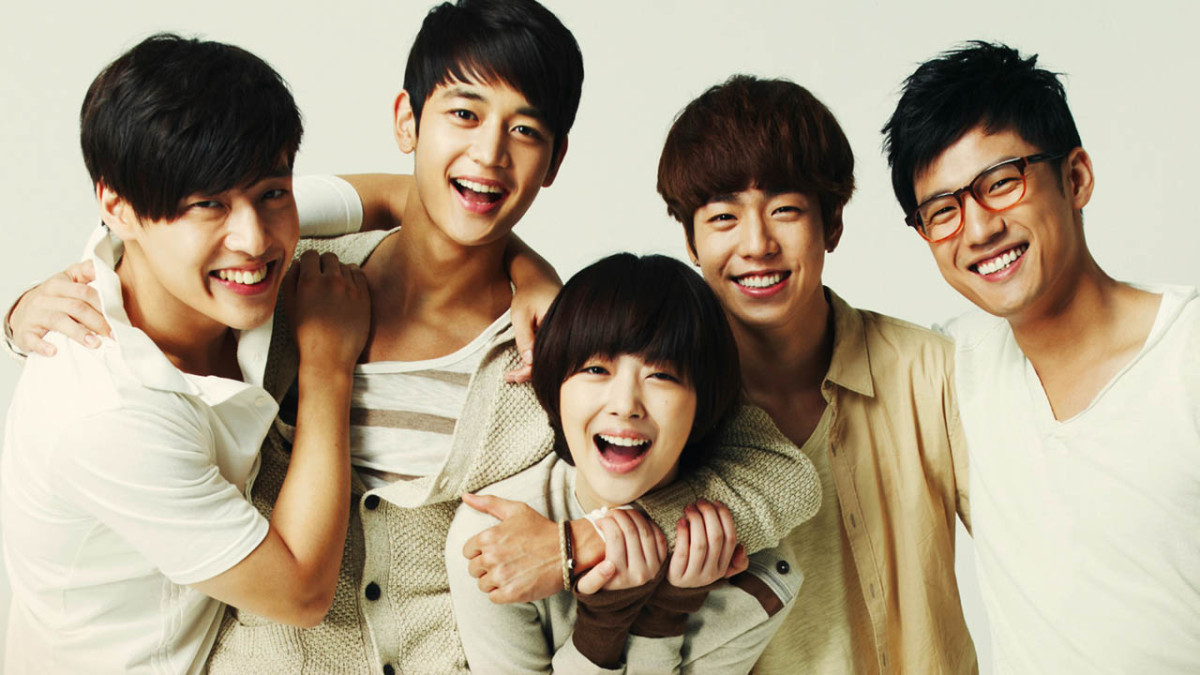 Ultra Fan Guide to Ayase Haruka
Ultra Fan Guide to Ayase Haruka
Recently there was a forum discussion — it was about underrated dramas. A few users discussed that a particular drama is totally underrated and that they felt sad about it and could not understand how people could not love this drama — obviously, the participants of this discussion were very emotional about it. The drama they talked about was The Legend of The Blue Sea and it has an overall rating of 8.4!
On the other hand, there was a post in the feeds where a MDLer promoted down-rating because he/she thinks positive ratings are given too easily. Therefore, the ratings are too promising and cause disappointments while watching.
Apparently, it is a sensitive topic which splits up the community, although everyone has a common base since all MDLers love Asian dramas. That is why I created a survey and did some research on MDL. Thanks to the 128 participants who submitted their answers to the questions! So hopefully this article helps the members of the community to be more patient and understanding towards each other and be less angry and frustrated.

Time to Rate
The overall rating of a drama on MDL means the average value of all ratings submitted by MDL users. Included in this particular rating are all submitted ratings for drama states of Current Watching, Dropped and Completed. On Hold, Plan to Watch and episode ratings are not part of the overall rating. Ratings in connection with reviews will not be considered as well.
But when is the right time to rate a drama?
All participants in the survey got asked which moment they chose to rate a drama.
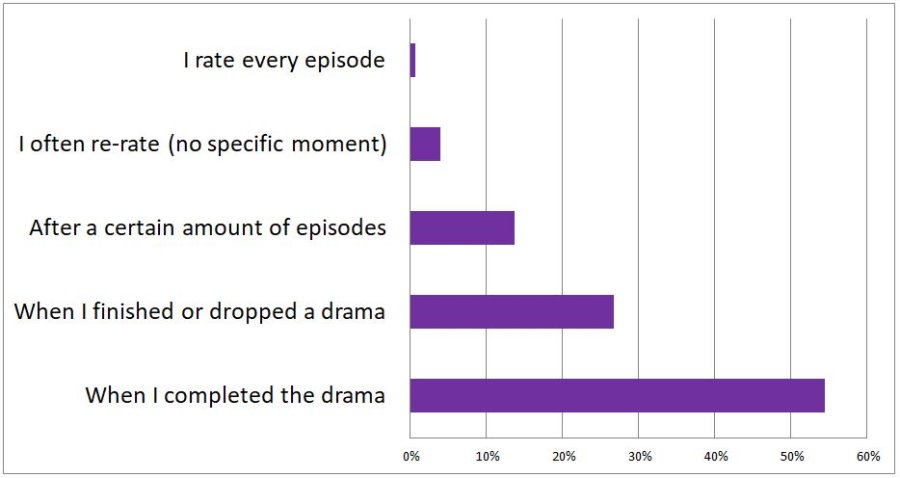
If one follows the Feeds on MDL, there are always users who get upset because of the others who rate before finishing the drama. One person in the Feed stated it like this: When you haven't completed it, is that you aren't giving the show a chance or you can't possibly be objective if you haven't seen the entire drama [...] Obviously this attitude is the most common one on this platform. But it is a narrow majority of 54%.
Another 27% of participants think the moment after they dropped a drama is a valid time to rate it, as well as the moment when they completed a drama. A lot of people who read this will get angry now. But just think about one aspect. If a drama was not worth to be finished by this person, why should this person not be allowed to rate the drama, since they gave it a chance to amaze them? Isn't the number of people who got disappointed an indicator for the quality of a drama as well? Would it distort the overall rating if only people who finished it would rate it - because the probability for a positive rating increases if a person watched the drama till the end?
Whoever became emotional just then, will now develop even more anger when they think about the people who already rate a drama after watching a certain amount of episodes (14%). Sure, some people could argue that after a certain amount of episodes the rating person is not able to come to a conclusion about the quality of the drama. But did this angry person think about the fact that the person will change their rating after watching if they change their opinion about the drama? After a certain amount of time, the user will even out his/her overall rating. So who cares if a drama is hyped during airing?
4% of the participants even re-rate more than once as this user reported: "I occasionally rate dramas before I finish them if I have a strong feeling about the quality (and then I update the rating as I watch), but usually, I binge watch and rate at the end [...]". Maybe it is important for the users to know that every rating counts once per user. So if one user re-rates and re-rates again, it is still only one rating in the statistics. It only replaces the value of the rating.
Drama Statistics
If one is sceptical of the rating because of that, this person can check the drama statistics (attached to all dramas on MDL). The pie chart shows the statistics of all users who added this drama to their list, e.g. 5,8% of all users are currently watching it at the moment. As the overall rating of a drama includes the ratings from Current Watching, Dropped and Completed (red marked in the graphic), this 3 components are equated to 100% overall rating. Therefore, roughly 12% of all included ratings are made by persons who didn't finish the drama.
Let us assume that everyone who dropped it rated it with 1.0 and counting from an audience rating of 10, the 'Dropped' group would reduce the rating to 9.7. That is only 0.3 points. And in this calculation, it is not included that users who are currently watching this drama will most likely give a higher rating, and they are more than double the number of people compared to the 'Dropped' group.
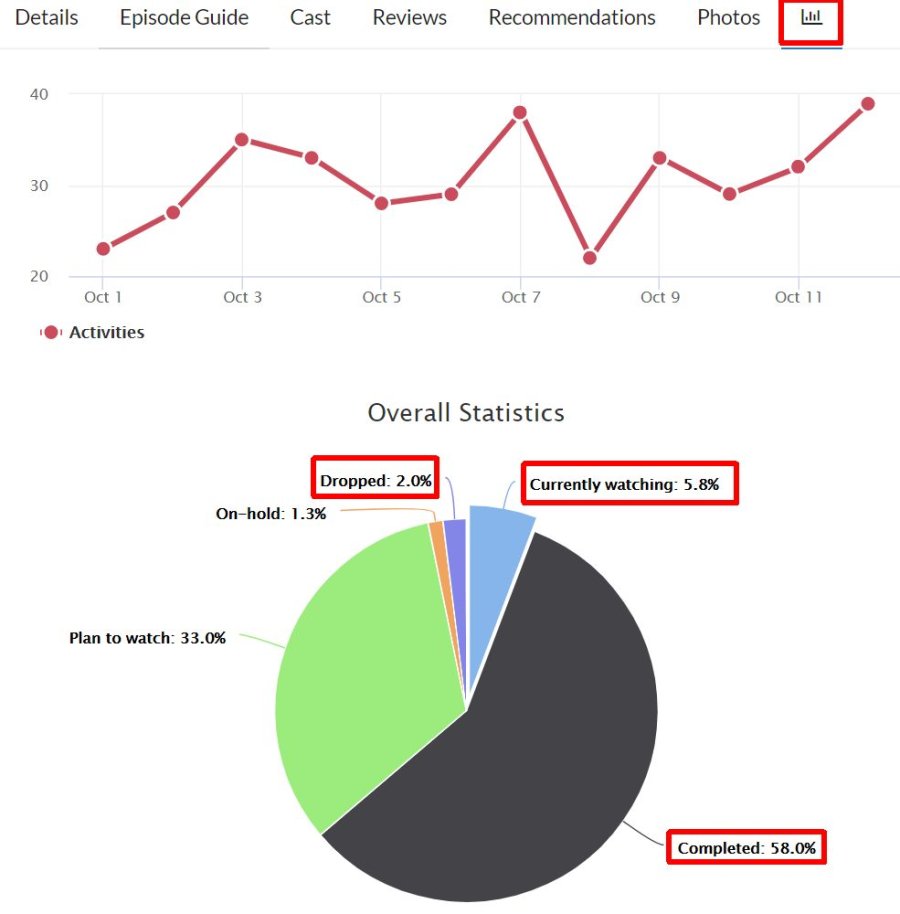
Maybe it would simplify the calculations and be clearer for the users if the statistic would add a pie chard only with the red marked components.
10 out of 10
On MDL 10.0 is the highest rating a show can reach. But what is needed for a drama to merit the highest mark? The participants got asked, “What is absolutely needed to be great for you to rate a drama with 10 out of 10?”. They got 16 options as well as the opportunity to add another option themselves.
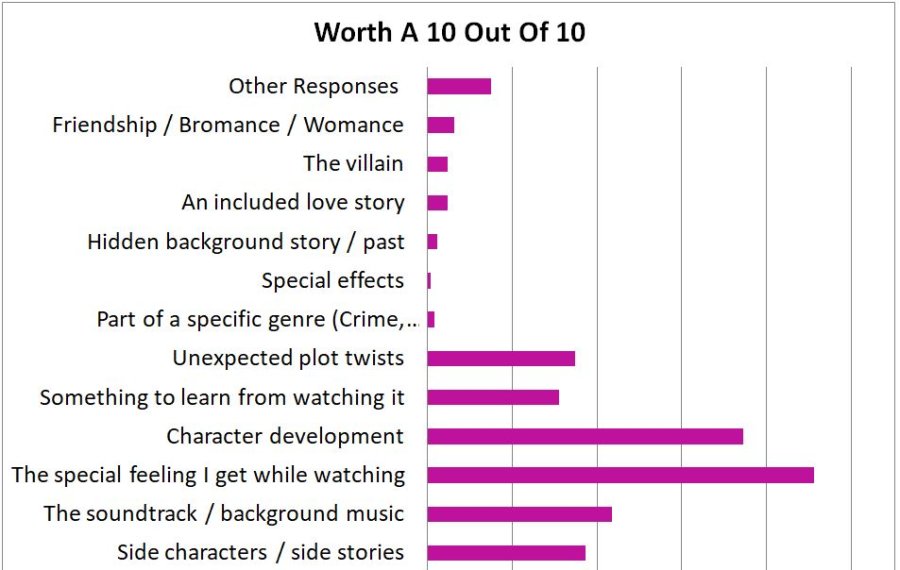

Not even one option got elected by all participants unanimously. The most important aspects are a great story (95%), closely followed by the special feeling (91%), while for 75% character development comes in third place. The least important aspects in this question were Special Effects (1%), a specific genre (2%) and a hidden background story (3%). Surprisingly, an included love story and an amazing villain were not of high importance either (both 5%). The most self-added aspect which was named in 'Other Response' was how well the drama is edited and directed.
The smallest number of chosen combinations that are needed for a 10 out of 10 were 3 — the special feeling was not included in this personal voting. The largest amount of combined options were 16 aspects. It shows that every assessment standard varies a lot.
But as this participant stated: Ratings on MDL are not trustworthy, ratings are like reviews, they should be done objectively and not on personal feeling. |
Every term contains a different meaning for everyone. What is a great story? What is an unexpected plot twist? Is the twist unexpected for another person too? And at last, the special feeling which is an important criterion for most people is definitely totally subjective.
One person stated it like this: Rating is a very personal matter as each of us is putting different meanings behind the process (as suggested by question 5), and we are not professional critics [...]
So maybe... (just maybe!) it doesn't even make sense to ask why someone rated a drama as he/she did because it is no mathematical calculation with one right answer and consequently it doesn't make sense to upset someone or feel upset if someone questions a rating.
Bad Rating
As indicated at the beginning of this article the sense of good and bad is very individual. Therefore, the participants got asked two questions: "what do they consider as a bad rating" and "which rating is needed for them to start a drama". From a purely logical point of view, this number should be the same. But it is not like that, as one participant kindly criticized about the survey: In question 8) Which border do you consider as bad rating? It might be worthy to specify it a bit more. ex. when I give a rating, I consider lower than 6 “bad” but when I check a drama and its overall rating is 7,5 or less I consider it bad - you will understand soon, why it was conceived like that.
Let's start with the bad rating:
From a mathematical point of view a rating with a maximum of 10 reachable points it should be divided like this:
Bad Rating: 0 - 3.3 | Neutral rating: 3.4 - 6.7 | Good Rating: 6.8 - 10
The participants said the following:
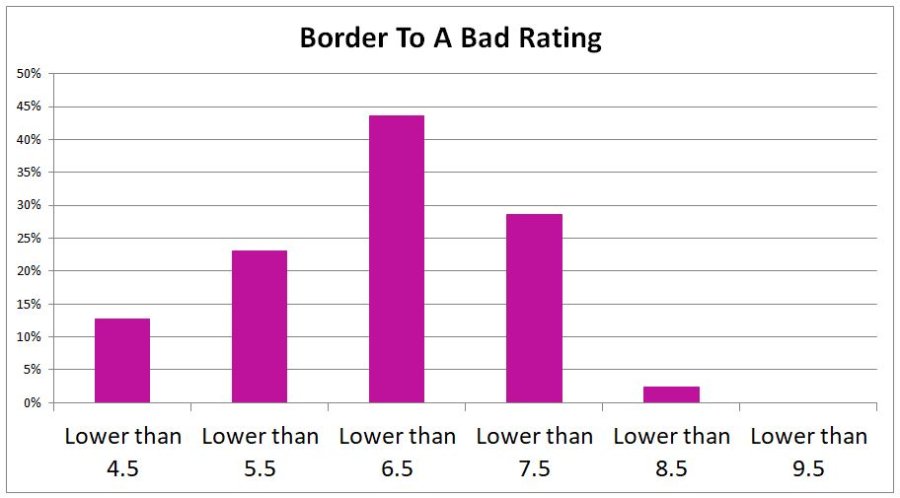
44% of the participants considered a rating of 6.5 as a bad rating, which matches in terms of figures. Only 2% think that 8.5 is already a bad rating.
Border to start a Show
If 6.5 is considered as the border of a bad rating, it would mean a rating of at least 6.6 is needed to start a drama. To not make the participants just choose the same rating for the border above, I created a different range of options. This way the participants had to question themselves separately if what they considered as a bad rating stopped them from giving a chance to the drama.
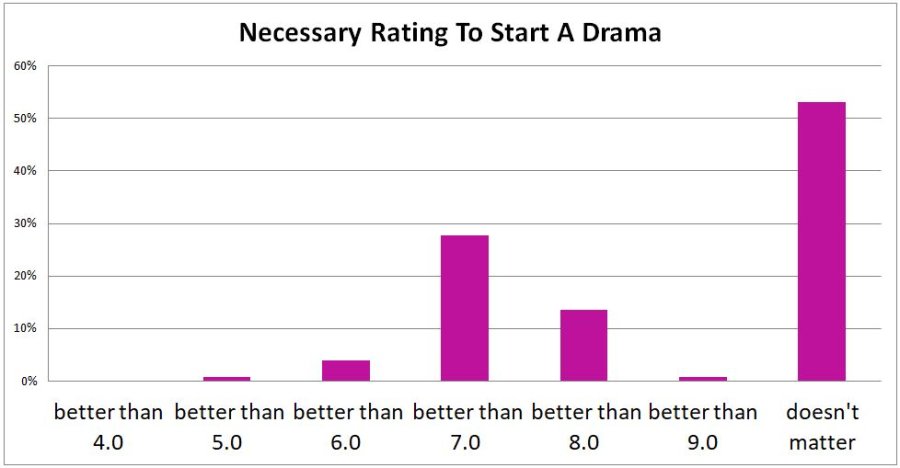
The most interesting point is that 56% of all participants do not make the decision to start a drama based on the rating. They just watch what seems to be interesting for them. Nobody declared 4.0 as the border to start a drama. An interesting side fact is that only 4.5% of all dramas on MDL are lower rated than 5.0.
Comparison
Considering that most participants judge everything below 6.5 as a bad rating, it is not surprising that 7.0 is the most chosen border to start a show. For 34%, the chosen value for the second question differs only 0.5 from the personal feeling of a bad rating. So both attributes match each other.
As described 56% gave no consideration to a bad rating or judged based on overall ratings.
Therefore, 12% of the participants obviously apply double standards. The highest difference was 4.5 versus 8.0. These people seem to not trust the overall rating, maybe because they understand that bad ratings depend on the feelings of the general audience.
It is interesting that 81% of people who consider 4.5 as bad rating did not mind rating it like this when they chose a drama at all. It is possible that the people in this category are rather less emotional when it comes to ratings.
Triggered Emotions
It is beyond question that the ratings are a very emotional topic for a lot of MDLers as this participant wrote down in the survey: Rating is a very personal matter as each of us [are] putting different meanings behind the process [...] even if they are not that good compared to other [dramas], they had a special meaning or gave strong feelings at that particular time of my life [...]
That is why the participants should state if they felt sad/angry if a drama they liked got a bad rating.
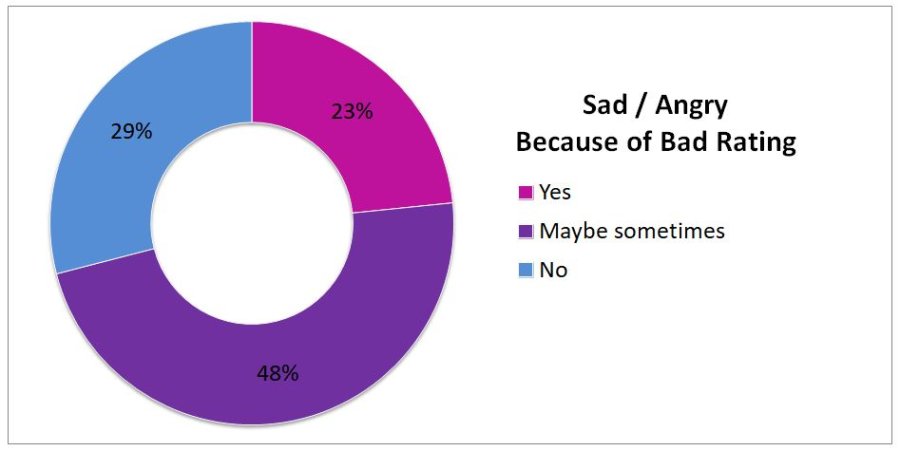
According to the answers, 71% of the responding users feel at least sometimes negatively influenced when a drama gets a rating that doesn't match with their own assessment.
Based on statements of participants and psychological research, one could say there are three types who feel sad/angry:
The Guilty Ones feel bad for the film crew, the actors and all the people who worked hard to create the drama. They glorify the show business without considering it as a job. Because they love the drama world so much, they feel sad if they get confronted with negative vibes or feel guilty if they have to say something slightly negative about their beloved world and moreover, are afraid to take another users' chance to love the show by giving a bad rating.
On the other side, there are the Crusaders. They feel like they judge a drama objectively. They are convinced the drama matched all necessary points to deserve the rating they defined. If the overall rating doesn't match their opinion, they become angry and feel wronged by the foolishness of the unfaithful.
After watching a drama a fan is very emotional about it. An overall rating is a cold and harsh number. Only a number without a face and relationship. So the watcher feels confronted with this law-like rating. If it differs a lot from his/her judgment, the person feels as if the whole group/community is of another opinion. That makes them feel like Castaways — the person feels sad because his / her feelings are not accepted or replied.
Very emotional reactions are very typical of young people. An adult could grin about it, BUT feelings are feelings! All of you love dramas — maybe you will have some amazing conversations with a different point of view if you give it a try like this participant said: I love that dramas are not all the same to everyone. If we all had the same tastes and reactions to the same drama, we would have nothing to discuss. I also love the fact that sometimes I like or don't like a drama and some opposite reviews give me a new way to look at it and I try reevaluating.
Down Rating
Down rating means to submit a worse rating than necessary to influence the overall score because a person thinks the overall score is wrong. Here is a quote of one participant who didn't think about this option before: I hope people don't down-rate things just to change the overall score, that is such a disappointing idea, :(
People who down rate are usually of the type Crusaders, but also could be just very disappointed with a drama they hoped to love. The participants got asked if they use down-rating sometimes.
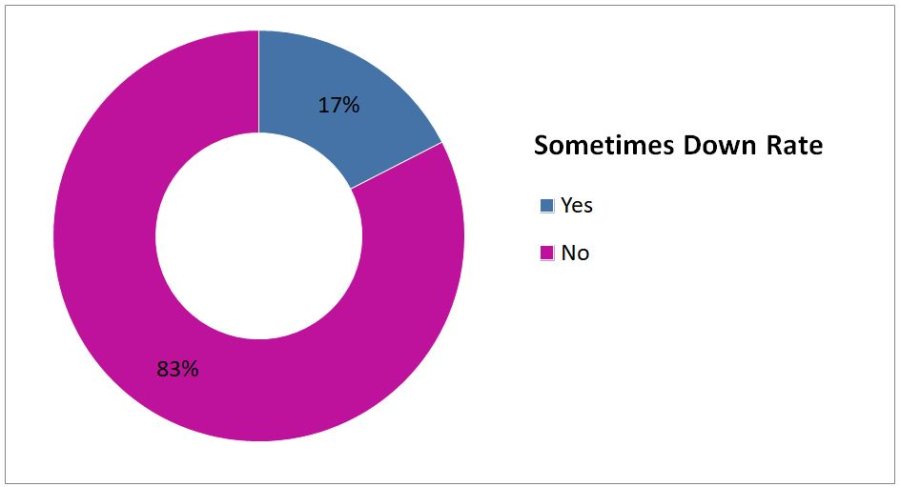
Obviously, the majority doesn't do down rating. But 17% does it. What is the effect?
Estimate a drama has an overall rating of 9.0 which is free of down rating. If 17% rate this drama with 1.0 to influence the overall rating, it means the rating will shift to roughly 7.6. So it falls down to this position and scratches the border to a bad rating. But sometimes doesn't mean these people do it to all dramas. Therefore, this example is very extreme!
I tried to ask for the reasons in the feeds and with another survey, but not enough down-raters answered why they think it is justified to do so. That is why there will be no proper explanation for this here. Is it fair or not... But what about up-rating then? It is to assume there is also up-rating existent as this quote lets it appear: Usually I don't rate under 5, because I don't want to minimize the overall rating or because I trust my interests and watch only what I like. Furthermore, after a time in movie/dramaland, you are able to understand if something is going to be good. So, you both save your time and the bad rating.
If there are up-raters and down-raters, will there not be a balance in the end? On one hand, isn't it fair to adjust it if the overall rating is confusing and leads to disappointment? But on the other hand, it is MyDramalist and not OurDramalist. Should a user be more focused on their own list to document what they like and what they don't like in whatever form?
People are diverse, so our tastes. Before you start a discussion over ratings, ask yourself what is your motive and try to be open-minded. In the end, the rating is something very emotional and subjective. Every person has only one voice anyway. Therefore, every MDLer should feel free to do as they please.
However, be nice to each other and never forget to have fun!
